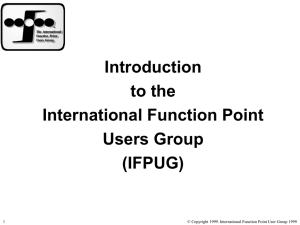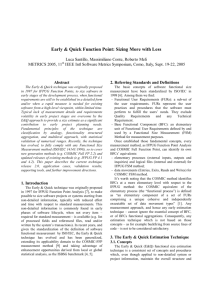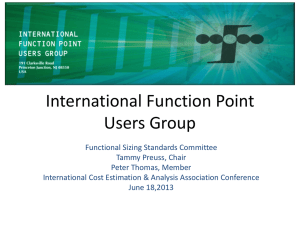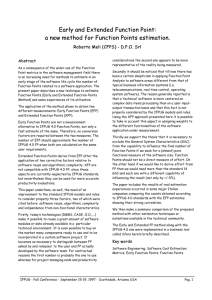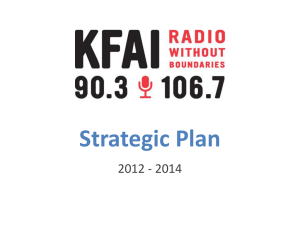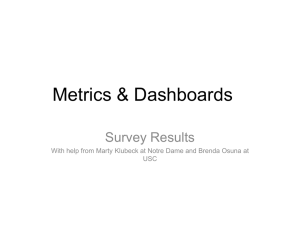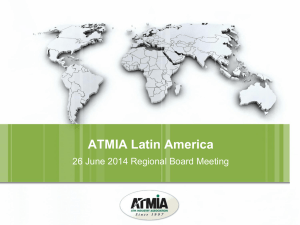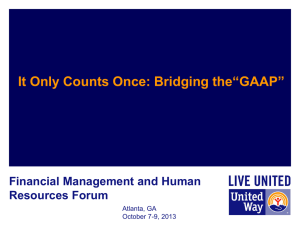IFPUG-in-a-Box Color
advertisement
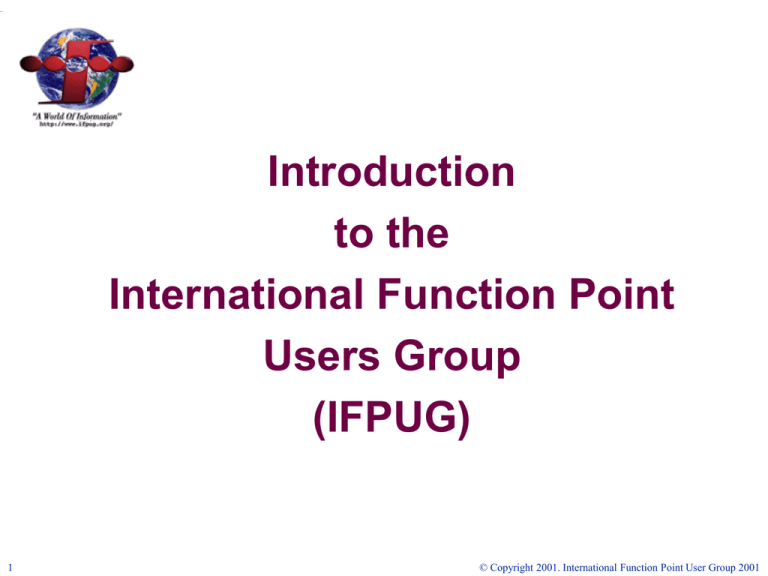
.. Introduction to the International Function Point Users Group (IFPUG) 1 © Copyright 2001. International Function Point User Group 2001 .. Introduction to the International Function Point Users Group (IFPUG) Credits: We would like to thank the following individuals and companies for their contributions to this presentation: • • • • • • 2 Mick Burn-Murdoch - Software Measurement Services, Ltd. Carol Dekkers - Quality Plus Technologies, Inc. Sheila Dennis - DFAS David Garmus - David Consulting Group Scott Goldfarb - Q/P Management Group, Inc. Cindy Woodrow - First Citizens Bank © Copyright 2001. International Function Point User Group 2001 .. Agenda • Introduction • Why use Function Points – Managing Your Software – Managing Your Organization – Function Points vs. Lines of Code • • • • • • 3 How to Count Function Points IFPUG History IFPUG Structure IFPUG Committees and Affiliates How Can Your Organization Benefit from IFPUG Questions © Copyright 2001. International Function Point User Group 2001 .. IFPUG Mission Statement • The mission of the International Function Point Users Group is to be a recognized leader in promoting and encouraging the effective management of application software development and maintenance activities through the use of Function Point Analysis and other software measurement techniques. • The International Function Point Users Group serves to facilitate the exchange of knowledge and ideas for improved software measurement techniques and seeks to provide a composite environment that stimulates the personal and professional development of its members. Taken from Vision Plan 2005 IFPUG’s strategic plan 4 © Copyright 2001. International Function Point User Group 2001 .. Objectives of Function Point Analysis • Measures software by quantifying the functionality requested by and provided to the customer based primarily on logical design • Measures software development and maintenance independently of technology used for implementation • Measures software development and maintenance consistently across all projects and organizations 5 © Copyright 2001. International Function Point User Group 2001 .. Function Points are a Unit of Measure External Input External Output External Inquiry Application Being Considered Internal Logical File External Interface Files External Input External Output External Inquiry Other Applications • Functionality as viewed from the user’s perspective 6 © Copyright 2001. International Function Point User Group 2001 .. Why Use Function Points • Managing Your Software 7 © Copyright 2001. International Function Point User Group 2001 .. Software Development Challenges • Size of Requirements • Changes to Requirements • Estimation Based on Requirements • Measuring and Improving Productivity and Quality 8 © Copyright 2001. International Function Point User Group 2001 .. Size of Requirements • Requirements – Complete – Business Terms – Mutual Understanding – Document Assumptions – Size 9 © Copyright 2001. International Function Point User Group 2001 .. Changes to Requirements • Changes to Requirements – Change Inevitable – Trade-offs – Customer Definition of Quality – Size 10 © Copyright 2001. International Function Point User Group 2001 .. Changes to Requirements Delivered Application Requirements 100 FPs Functional Design Detail Design 120 FPs 130 FPs • State code input screen changed (3 FPs) • Interface to N&A file added (10 FPs) • N&A inquiry and state code inquiry added (7 FPs) • New regulatory table added (10 FPs) 135 FPs • Summary report added (5 FPs) Impact Effort Schedule Cost 11 + 1 month + 2 weeks + $5 K + .5 month + 1 week + $2.5 K + .25 month + 2.5 days + $1.25 K © Copyright 2001. International Function Point User Group 2001 .. Estimation Based on Requirements • Estimation Based on Requirements – Multiple Models – Weighted Inputs: • Language • Skills • Methodology • Risk Factors • Size – Historical Base 12 © Copyright 2001. International Function Point User Group 2001 .. Estimating Examples 13 Project Estimate Based on Historical Data and/or Vendor Tool Function Point Size Project Variables Project A – 100 FPs • • • • On-line/database New development C++ Highly experienced development staff Effort = 5 months Schedule = 3 months Cost (@ $5K) = $25,000 KLOC = 6 Delivered Defects = 25 Productivity Rate = 20 FP/Month. Project B – 100 FPs • • • • Batch Enhancement Cobol Average experienced development staff Effort = 20 months Schedule = 6 months Cost (@ $5K) = $100,000 KLOC = 10 Delivered Defects = 100 Productivity Rate = 5 FP/Month © Copyright 2001. International Function Point User Group 2001 .. Measuring and Improving Productivity 0.35 0.3 0.25 FP/Hour 0.2 0.15 0.1 0.05 0 0 50 100 150 200 250 300 350 400 450 Project Function Point Size • Every organization has an optimum size/productivity range 14 © Copyright 2001. International Function Point User Group 2001 .. Why Use Function Points • Managing Your Organization 15 © Copyright 2001. International Function Point User Group 2001 .. Asset Management Application Portfolio Size = 50,000 Function Points Systems A BC D G 16 H E I Replacement Cost = $300,000,000 Growth = 7% per year F J K L Support Cost = $20,000,000 per year © Copyright 2001. International Function Point User Group 2001 .. Function Points and the CMM • Function Points are the metric of choice for many of the activities required in the SEI CMM Level 2 • With the next release of the CMM, metrics becomes a Key Process Area in its own right 17 SEI Capability Maturity Model 5. OPTIMIZING Process control 4. MANAGED Process measurement 3. DEFINED Process definition 2. REPEATABLE Basic management control 1. INITIAL Ad hoc Process Maturity Levels © Copyright 2001. International Function Point User Group 2001 .. Improving Customer Relations • Predictable Time scales • Predictable Costs • Predictable Functionality 18 © Copyright 2001. International Function Point User Group 2001 .. Organizational Improvement • Process Measurement • Project Management Metrics – – – – Estimates Productivity Defect Densities etc. • Benchmarking 19 © Copyright 2001. International Function Point User Group 2001 .. Why Use Function Points • Function Points vs. Lines of Code 20 © Copyright 2001. International Function Point User Group 2001 .. Function Points not Lines of Code • Technology and platform independence • Available from early requirements phase • Consistent and objective unit of measure throughout the life cycle • Objectively defines software application from the customer perspective • Objectively defines a series of software applications from the customer’s, not the technician’s perspective • Is expressed in terms that users can readily understand about their software 21 © Copyright 2001. International Function Point User Group 2001 .. What is Wrong with Lines of Code? • There is no standard for a line of code • Lines of Code measure components not completed products – Don't measure the panels produced; measure the number of cars assembled • Measuring lines of code – Rewards profligate design – Penalizes tight design • Positively misleading? 22 © Copyright 2001. International Function Point User Group 2001 .. Classic Productivity Paradox Lines of Code 10,000 3,000 Function Points 25 25 Total Months effort 25 15 $125,000 $75,000 $12.50 $25.00 Lines per Person month 400 200 FPs per Person month 1.2 2 $5,000 $3,000 Total Costs Cost per Source Line Cost per FP 23 © Copyright 2001. International Function Point User Group 2001 .. How to Count Function Points 24 © Copyright 2001. International Function Point User Group 2001 .. How to Count Function Points Displays Reports Master Files Size Control Files Reference Files Signals 25 © Copyright 2001. International Function Point User Group 2001 .. Steps in FP Counting • Determine Type of Count • Identify Counting Scope and Application Boundary • Count Data Functions • Count Transactional Functions • Determine Unadjusted Function Point Count • Determine Value Adjustment Factor • Calculate Adjusted Function Point Count 26 © Copyright 2001. International Function Point User Group 2001 .. FP Overview: What Is Counted EI P1 Update Master File P2 EO Master ILF Produce Weekly Report File Key System Boundary P3 Master File Details Weekly Summary Report Details Reference File on another System EIF EQ 27 © Copyright 2001. International Function Point User Group 2001 .. Functional Size (Unadjusted Function Size) 30 Function Type Low Average High EI x3 x4 x6 EO x4 x5 x7 EQ x3 x4 x6 ILF x7 x 10 x 15 EIF x5 x7 x 10 © Copyright 2001. International Function Point User Group 2001 .. Value Adjustment Factor • Based on 14 General System Characteristics (User Business Constraints Independent of Technology) – Examples: data communications, response times, end user efficiency, multiple sites and flexibility • Adjusts FP count by up to + / - 35% 31 © Copyright 2001. International Function Point User Group 2001 .. IFPUG History 32 © Copyright 2001. International Function Point User Group 2001 .. History - Early Days 1979 Function Points introduced by Allan Albrecht 33 1984 First formal Function Point Guidelines 1986 IFPUG elects first Board of Directors 1990 Function Point as Assets Manual 1991 Certification for training materials IFPUG Hotline established 1993 Certified Practitioners Participation in ISO/IEC © Copyright 2001. International Function Point User Group 2001 .. History - Modern 34 1994 CPM release 4.0 Participation in International Software Benchmarking Standards Group (ISBSG) 1995 Guidelines to Software Measurement IFPUG Home Page Introduced 1996 Case Study 3 released 1997 10th Anniversary Celebration! 1999 CPM release 4.1 © Copyright 2001. International Function Point User Group 2001 .. IFPUG Structure 35 © Copyright 2001. International Function Point User Group 2001 .. Management Structure President Immediate Past-President Vice President Board of Directors Committees 36 Executive © Copyright 2001. International Function Point User Group 2001 .. President Vice President ISO Task Force Secretary ISBSG Task Force Treasurer Director of Education & Conference Services Director of Applied Programs IT Performance Committee Immediate Past President Management Reporting Committee Education Committee Conference Committee Acedemic Affairs Committee Director of Counting Standards Certification Committee Counting Practices Committee Director of International / Organizational Affairs Communications & Marketing Committee New Environments Committee 37 © Copyright 2001. International Function Point User Group 2001 .. IFPUG Committees and Affiliates 38 © Copyright 2001. International Function Point User Group 2001 .. IFPUG Committees • • • • • • • • • • 39 Academic Affairs Communications and Marketing IT Performance Committee Management Reporting Education Services Counting Practices New Environments Conference Certification International Standards Organization © Copyright 2001. International Function Point User Group 2001 .. IFPUG Task Forces • International Standards Organization • International Software Benchmarking Standards Group 40 © Copyright 2001. International Function Point User Group 2001 .. Academic Affairs • Increase academic awareness of software measurement and Function Point Analysis • Support and promote graduate studies regarding FPA 41 © Copyright 2001. International Function Point User Group 2001 .. Communications and Marketing • MetricViews • Metrics Source • Monthly E-mail Update • Road show • Website 42 © Copyright 2001. International Function Point User Group 2001 .. IT Performance • Database of measurements from organizations worldwide • Compare against your organization’s results 43 © Copyright 2001. International Function Point User Group 2001 .. Management Reporting • Management reporting workshops • Publications to assist in using FP metrics for management reporting • Published Guidelines to Software Measurement 44 © Copyright 2001. International Function Point User Group 2001 .. Education Services • Basic Training • Advanced Practices • Management Courses 45 © Copyright 2001. International Function Point User Group 2001 .. Counting Practices • Publish Counting Practices Manual • Update Counting Practices Manual • Make Rulings on areas of Ambiguity 46 © Copyright 2001. International Function Point User Group 2001 .. New Environments • Links to new development techniques – – – – Investigate Hypothesize Test link Promulgate • For Example OO 47 © Copyright 2001. International Function Point User Group 2001 .. Conference • Presentations from Industry “Gurus” • Presentations from Practitioners • Networking opportunity • Workshops 48 © Copyright 2001. International Function Point User Group 2001 .. Certification • Tests for Conformance to Counting Practices Manual – Counters – Training courses – Software support tools 49 IFPUG Seal of Approval © Copyright 2001. International Function Point User Group 2001 .. ISO • Represent IFPUG at ISO working group meetings • Review developing ISO standards 50 © Copyright 2001. International Function Point User Group 2001 .. ISBSG • Represent IFPUG by serving as board member on the ISBSG board • Provide IFPUG members with discounts on ISBSG products 51 © Copyright 2001. International Function Point User Group 2001 .. Affiliations • 40 Countries • Corporate, Academia and Government Members • Regional Chapters in Brazil, South Africa, and the Midwest 52 © Copyright 2001. International Function Point User Group 2001 .. How Can Your Organization Benefit from IFPUG? 53 © Copyright 2001. International Function Point User Group 2001 .. IFPUG Benefits • Free copies of IFPUG standards manuals • Case Studies at member discounted rates • Member directory • Publications MetricViews, Metrics Source • IFPUG E-Mail List Serve & Private Home Page • Reduced rates for conference & workshops • Ability to participate on Committees • Networking, Professional Development 54 © Copyright 2001. International Function Point User Group 2001 .. How to Contact Us International Function Point Users Group 191 Clarksville Rd. Princeton Junction, NJ 08550 Phone: Fax: E-mail: Web: 55 (609) 799-4900 (609) 799-7032 ifpug@ifpug.org www.ifpug.org © Copyright 2001. International Function Point User Group 2001 .. How May We Help You? • Questions???? • Comments!!! • Suggestions!?!?!? 56 © Copyright 2001. International Function Point User Group 2001
